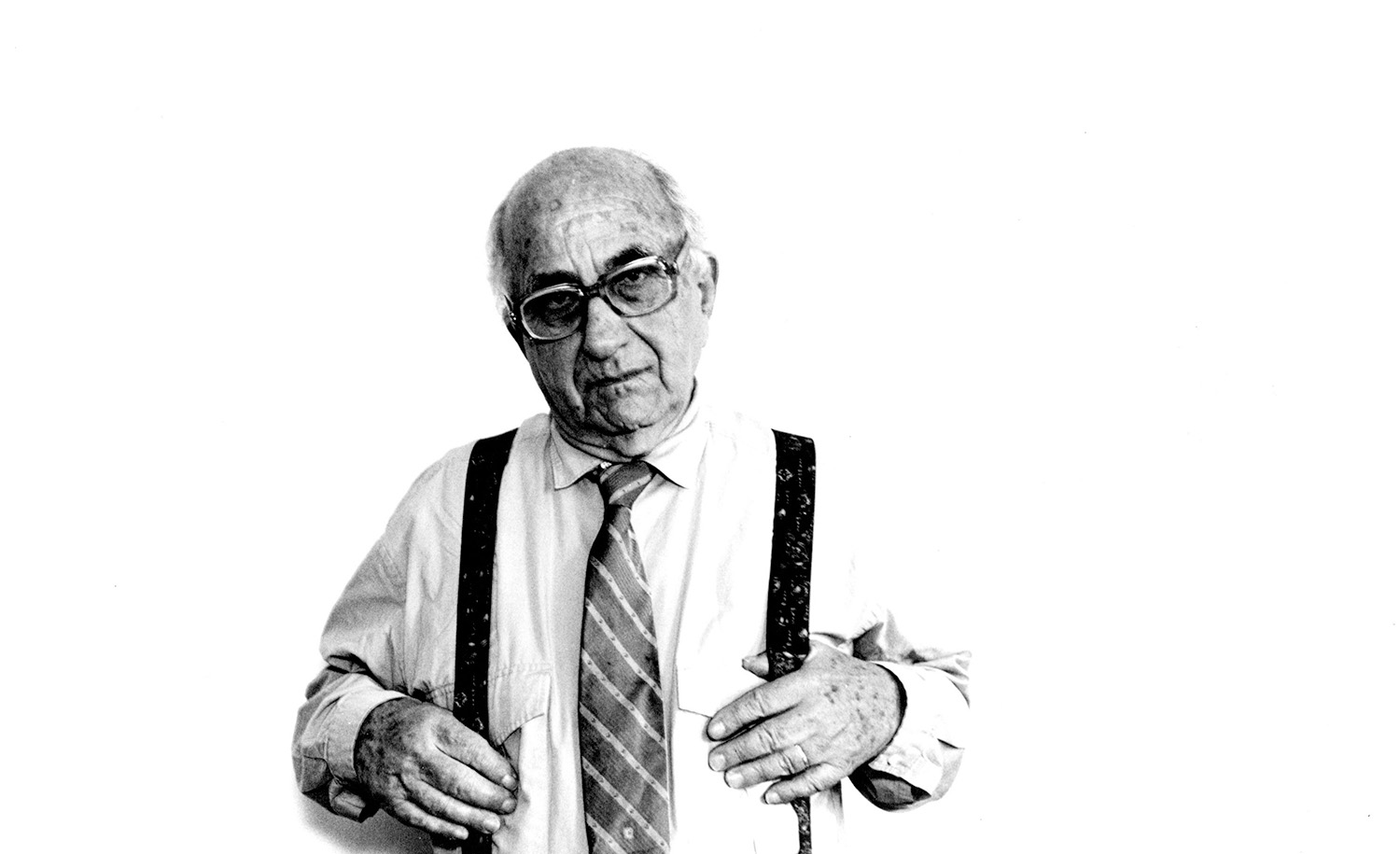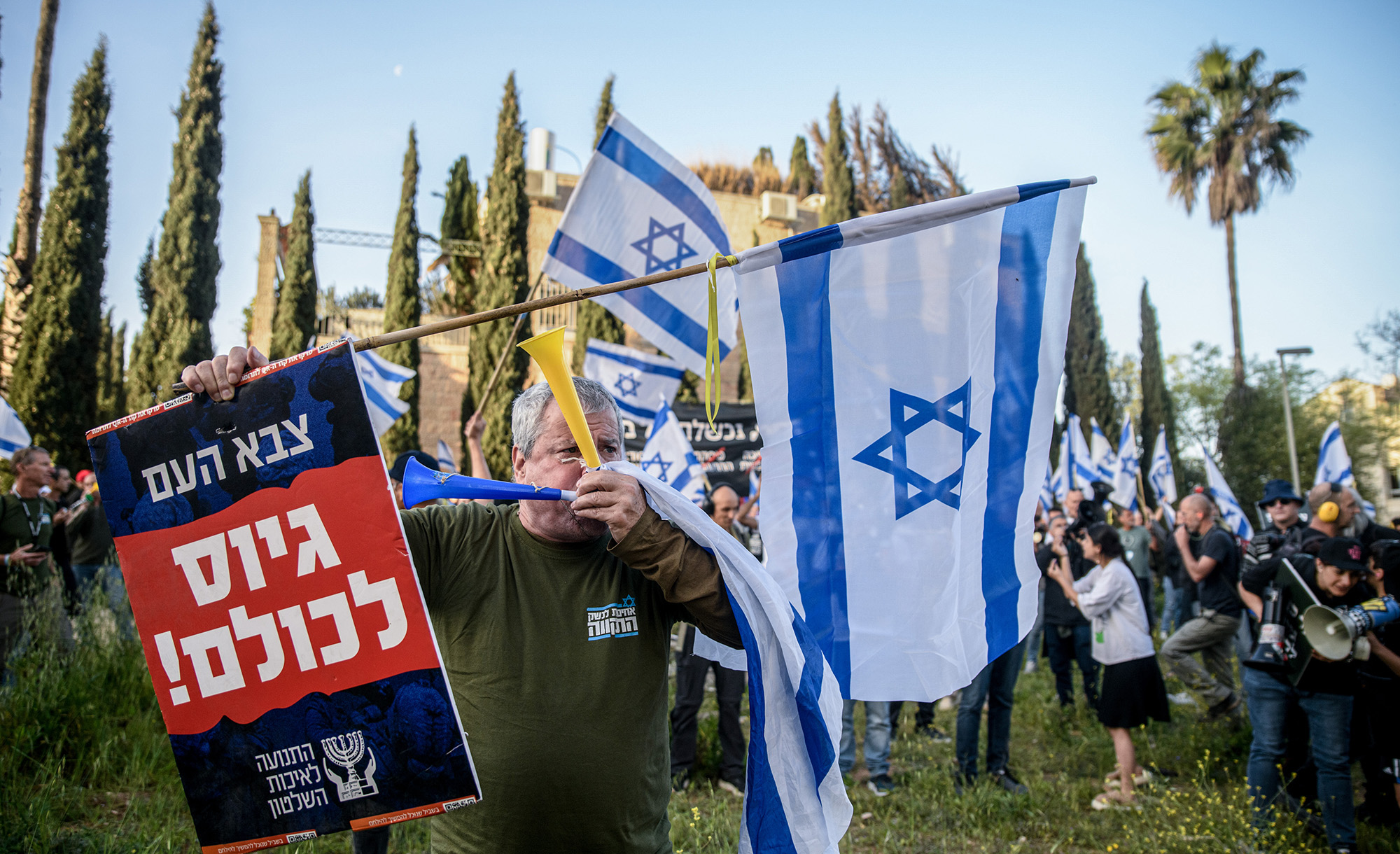On November 11, 1938 Emil L. Fackenheim found himself in a jail cell in his hometown of Halle, Germany, a city that briefly made headlines in 2019, when a gunman attacked its synagogue on Yom Kippur, and killed two people. An oppressive quiet pervaded the small holding cell, constructed to accommodate “at most six people but now crowded with twenty-odd Jewish men” who had been rounded up over the past two days, until an elderly man broke the silence, and voiced a question that was surely on the minds of all: “You, Fackenheim! You are a student of Judaism. You know more about it than the rest of us here. You tell us what Judaism has to say to us now!”
Though a precocious young rabbinical student, Fackenheim remained silent; despite having spent the last three years studying with the leading lights of Jewish thought at the Hochshule für die Wissenschaft des Judentums, the preeminent college for Judaic Studies in Berlin. The events of the previous 48 hours left him speechless. Kristallnacht had shattered so much, so quickly: the fury of destruction that burned synagogues across Germany, desecrated Torah scrolls, smashed and looted Jewish stores, had in that one fateful evening ended, in Fackenheim’s words, “the 1,000-year history of German Jewry.” Though the conflagration was only beginning and unimaginable horrors were yet to come, “the soul of German Jewry was destroyed in that single night, when houses of worship from which prayers had soared heavenward, in many cases for centuries, were burned down.” Despite his desire to speak comforting words, Fackenheim was dumbfounded—like so many, reduced to stunned silence. In the face of such destruction, what could one say? All his learning, erudition, and scholarship seemed woefully inadequate in the face of such events.
Fackenheim would spend the next three months struggling to endure the physical hardship and spiritual degradation of Sachsenhausen, before being granted a brief reprieve thanks to the promise of work in America and the possibility of attaining an exit visa. With six weeks to leave the country on pain of being thrown back into the hell of concentration-camp life, Fackenheim raced to procure the necessary papers and to make arrangements for his parents and siblings to follow. He would soon make his way to Aberdeen, Scotland, and then to Toronto, where he received a PhD in philosophy and would remain for the next 40 years, first serving as a congregational rabbi and then teaching German philosophy at the University of Toronto. In 1984 Fackenheim made aliyah, realizing a long-deferred hope to settle in the Land of Israel. He died in 2003.
But he never forgot the old man’s question, and as the horrors compounded and the unimaginable became a reality, that haunting question only became more urgent. The question—what has Judaism to say now?—would guide Fackenheim’s work for the next 50 years, as he strove to come to grips with the Shoah, “a whole world of horror” where, in the words of his contemporary Hans Jonas, “more was actual than was possible.”
A new book by Kenneth Hart Green, The Philosophy of Emil Fackenheim: From Revelation to the Holocaust, takes up the challenging task of exploring Fackenheim’s struggle to make sense of what had happened and to think through how Jews ought to respond. A former student of Fackenheim’s and a scholar of Maimonides and Leo Strauss, equally familiar with rabbinic sources and secular philosophy, Green possesses the ideal background for such an undertaking. The book is the consummation of a lifetime of reflection not only on Fackenheim’s unique combination of Jewish thought and philosophical speculation but also on those few, fundamental, and enduring questions that vex every age—the relation between reason and revelation, Athens and Jerusalem, the world of historical change and the search for timeless truths. Green’s familiarity with the tradition that spans from Moses Maimonides to Martin Buber, from the Zohar to Joseph B. Soloveitchik, and from Baruch Spinoza to Gershom Scholem allows him to guide his readers through a number of philosophical and theological questions, attending to Fackenheim’s debt to the tradition while also illustrating his unique contribution and innovative response to the Holocaust, the crisis of his age. Green’s admiration, respect, and gratitude for his former teacher is evident, yet he avoids flattery and, as befits the best students, his work exemplifies Aristotle’s ancient adage, “a friend to Plato, a better friend to the truth.”
In lieu of attempting to summarize the book, I will focus on its treatment of Fackenheim’s most controversial thesis: that one hears in the silence of the Shoah’s victims a voice issuing a 614th commandment, and Green’s most original contribution to the interpretation of Fackenheim’s work—namely, that to understand Fackenheim’s post-Holocaust theology as well as the reasons Fackenheim thought it necessary to establish new “foundations of post-Holocaust Jewish thought” requires his readers to grapple with the possibility that the radical evil of the Shoah is best understood as “a diabolical revelation.”
From its very origins, Judaism has wrestled with the problem of evil, with the question of how a good God could allow the wicked to prosper and the righteous to suffer. From Genesis to Job, from Isaiah to Ecclesiastes, and in Lamentations and Psalms, the Tanakh tells the story of a people who, despite all their suffering, remain stubbornly committed to the God of Abraham, Isaac, and Jacob. Such steadfast fidelity, however, did not shun the often-harsh reality of the Jews’ condition, nor did their devotion blind the Jews to the reality of either suffering or wickedness. Likewise, rabbinic Judaism—as the debate between Hillel and Shammai on the question of whether it would have been better for man never to have been created illustrates—does not shy away from the gravest of questions, finding through the grace of God a way to affirm life despite the conclusions of rational argument.
But the Holocaust was an unprecedented evil in human history. In its shadow, how could Jews go on believing in a redemptive God, or affirm that ancient blessing, l’ḥayyim? For Fackenheim, the Holocaust is entirely unique, surpassing the despotism of Pharaoh, the deprivations of the Babylonian exile, and the ruthless destruction of Jerusalem at the hands of Nebuchadnezzar and Titus. Hitler’s reign of terror and the Nazi’s evil surpasses even the crimes of Torquemada; for unlike Torquemada, who “destroyed bodies in order to save souls, Eichmann sought to destroy souls before he destroyed bodies.” Fackenheim understood the Holocaust as an eruption of evil and irrationality without parallel. All attempts to comprehend or to grapple with what happened—to explain, understand, or account for—founder on “the scandalous particularity of Auschwitz,” which seems to elude philosophical categories and theological attempts at explanation. As Fackenheim provocatively states, “that where the Holocaust is, no thought can be, and that where there is thought it is in flight from the event.” How then are we to come to grips with the historical actuality that shaped our epoch, the “negative absolute” that disclosed a hitherto inconceivable capacity for evil?
Fackenheim’s contention that the Shoah is absolutely unique in its scale and evil allows us to see how his ideas might be defended against a possible objection: that, for instance, the Holocaust is a familiar episode in Jewish history, to be placed alongside the destruction of the two temples, and thus that it requires no theological innovation. Indeed, could one not see in Fackenheim’s inability to reply to the question posed to him by his fellow prisoner some failure of his prewar Jewish education? After all, shouldn’t several years of study of Jewish history and thought prepare a student to imagine the most predictable thing in Jewish history, that is, Jewish persecution? But in Fackenheim’s view, the Shoah was unlike past persecutions. And so the question lingers: in its aftermath, how are we to find our way along the horizon darkened by Hitler’s mendacity?
Fackenheim’s answer is that one must look for guidance to those who resisted in a time when resistance should have been impossible. Some did resist, revealing a dimension of the human spirit that could countermand history and say “No” to an acquiescent herd of yes-men. Fackenheim identifies several instances, both religious and secular, Jewish and Christian, of such bravery in the face of nihilism. The testimony of Pelagia Lewinska, which Fackenheim discusses in his magnum opus, To Mend the World, poignantly expresses the courage required to resist despair and affirm life in the Unwelt (anti-world) of Auschwitz:
They had condemned us to die in our own filth, to drown in mud, in our own excrement. They wished to abase us, to destroy our human dignity, to efface every vestige of humanity, to return us to the level of wild animals, to fill us with horror and contempt toward ourselves and our fellows.
But from the instant that I grasped the motivating principle, . . . it was as if I had been awakened from a dream. . . . I felt under orders to live. . . . And if I did die in Auschwitz, it would be as a human being; I would hold on to my dignity. I was not going to become the contemptible, disgusting brute my enemy wished me to be. . . . And a terrible struggle began which went on day and night.
For Fackenheim, our response to the trauma of the Holocaust must take its bearings from such testimony. Any authentic confrontation with the Holocaust, whether in theory or in practice, must begin from the absolute moral injunction formulated by Lewinska, a categorical imperative to resist such wickedness.
In the weeks leading up to the 1967 war, with the fate of Israel hanging in the balance, Fackenheim, like Jews around the world who held their breath in fear and trembling, anticipating the worst, had to confront the possibility that the Jewish state might suffer a second Holocaust. Although Israel’s seemingly miraculous deliverance from destruction and the equally astonishing return to Jerusalem were cause for celebration and thanksgiving, such triumphs could not dispel the shadows of memory. Having feared its recurrent possibility in the present, Fackenheim confronted more directly and unwaveringly its past actuality, asking himself first and foremost: “How should Jews respond?” His attempt to answer the question led to the formulation of the controversial “614th Commandment,” which “for post-Holocaust Judaism . . . would be as binding as if it had been revealed to Moses on Mount Sinai.” By referencing in an essay published in Commentary the rabbinic notion that the Torah contains 613 commandments, this formulation is intended to convey the awesome gravity and existential significance of Fackenheim’s prescription for how Jews ought to respond to the Holocaust. For Fackenheim,
Jews are forbidden to hand Hitler posthumous victories. They are commanded to survive as Jews, lest the Jewish people perish. They are commanded to remember the victims of Auschwitz, lest their memory perish. They are forbidden to despair of man and his world, and to escape into cynicism and otherworldliness, lest they cooperate in delivering the world to the forces of Auschwitz. Finally, they are forbidden to despair of the God of Israel, lest Judaism perishes.
In Fackenheim’s judgment, the moral imperative heard by all those open to the “commanding voice of Auschwitz” was nothing more than “the spontaneous but authentic Jewish response to the Holocaust.” It was not intended as the sophisticated speculation of an academic theologian or the conclusion of the abstract reasonings of a philosophy professor, but an articulation of what Fackenheim believed the Jewish people knew in their hearts. Reason could reflect later on the why; the first thing needful was a reconstituted people voicing in resplendent moral confidence a resounding “No!” For though Hitler had perished in an apocalyptic Götterdämmerung, his shadow continues “to darken the world.”
Yet no sooner had Fackenheim made such a bold, public, almost prophetic assertion then criticism immediately followed; of the many objections to Fackenheim’s notion of a 614th commandment, the most serious and the one Fackenheim wrestled with throughout the remainder of his life was one he had in fact anticipated: the objection that by elevating this imperative to the standard of the other commandments receive at Sinai, he was granting the horrific catastrophe of the Holocaust the status of revelation—in effect equating the highest point of Jewish history with the lowest.
It is this problem that Green’s book so relentlessly and doggedly probes, taking us into the heart of Fackenheim’s theology and his unceasing attempts to wrestle with the extraordinary implications of his own utterance. To expose himself and his thought to the trauma of the Holocaust in order to see what could be saved from the conflagration that threatened to consume all “Truth, Beauty, and Goodness” became Fackenheim’s life’s work, the core of his attempt to articulate a post-Holocaust Jewish philosophy. For Fackenheim, only by facing up to the historical rupture in all its stark horror could Judaism hold fast to the God of History; anything less would be an evasion of God’s absence during the nightmare of the Third Reich.
For Fackenheim, just as confronting the Holocaust in thought one must take one’s bearings from those who resisted, likewise philosophic comprehension should take its bearings from the practical response of Jewish life. As Fackenheim was wont to observe, thought lagged behind life; for while philosophy and theology were rendered mute by the horror of events (which so shattered all former concepts as to call into question the very idea of man), ordinary Jews were already at work building the state of Israel, which in Fackenheim’s estimation is nothing less than hope reborn. “The state of Israel is collectively what the survivor is individually—testimony on behalf of all mankind to life against death, to sanity against madness, to Jewish self-affirmation against every form of flight from it, and to the God of the ancient covenant against all lapses into paganism.” In the wake of a form of idolatry more terrible than the cult of Moloch that had likewise demanded sacrifice of innocent children, Jewish survival meant the repudiation of all such false gods. Israel, for Fackenheim, is a repudiation of Hitler, an affirmation of loyalty to the past and a promise to the future in the face of desolation, a celebration of life for a nation in mourning for the six million.
Fackenheim’s 614th commandment is thus not so much a new addition as a novel reformulation of that oldest imperative, the source according to tradition of Abraham’s merit: for it asserts nothing less than solidarity among Jews as Jews, whether religious or secular, on the basis that, as Rabbi Yoḥanan states in the Talmud, “anyone who repudiates idolatry is called a Jew.”
In pronouncing in thought and deed, word and act, an absolute “no,” an unwavering resistance to the radical evil of Auschwitz, the believing Jew as well as the Jew whose belief might consist—as it has for so many secular Zionists—primarily in belief in the Jewish people, discover a common ground upon which to reaffirm their fidelity with ancestors and commitment to posterity, and thereby to testify to the belief that Jews were singled out by God to be a nation of priests because their father Abraham was, in Fackenheim’s summation of a famous midrash, “the first in the history of humanity to smash the idols.”
For the 614th commandment affirms the chosenness of Israel in the face of that most terrible of idolatrous creeds, which had singled out Jews for slaughter on the altar of a racial ideology that sought to blot out every trace of the God of Israel. Although secular Jews may not observe Shabbat or kashrut, or even attend synagogue on High Holy Days, in willing the continuation of Jews as Jews, they testify in our pluralistic and tolerant age that some gods are false, and thereby are witness to the enduring importance of Jewish particularity in a world of universalism. They affirm, in other words, the idea of chosenness (which has proved such a stumbling block for modern Jews and Gentiles alike), and even if the words of the sh’ma rarely pass their lips, they affirm a future world in which Jews declare “hear, O Israel, the Lord is thy God, the Lord is one.”
More about: Emil Fackenheim, History & Ideas, Holocaust Memorial Day







